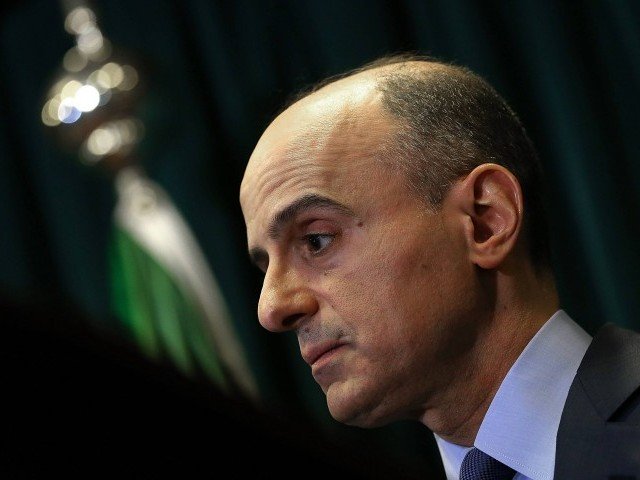
"The legal process is still ongoing and it's up to the courts to decide what happens in this case," Jubeir said at a press conference with his Austrian counterpart Sebastian Kurz.
Jubeir did not elaborate on what legal stage the case has reached, after Badawi's wife in June said Saudi Arabia's highest court had upheld a sentence of 10 years' jail and 1,000 lashes against him.
Sakharov prize 'message of hope', says wife of Saudi blogger
Badawi, 31, received the first 50 lashes in January but there have been no more, following criticism from the European Union, United States, Sweden, Canada, the United Nations and others.
Jubeir said the Saudi judicial system, which is based on Islamic sharia law, is independent.
"The Kingdom of Saudi Arabia respects the legal systems of every country and we expect other countries to respect our legal system," he said.
 Ensaf Haidar(C), the wife of the Saudi Blogger Raef Badawi, holds a vigil in Montreal, Quebec on January 13, 2015. PHOTO: AFP
Ensaf Haidar(C), the wife of the Saudi Blogger Raef Badawi, holds a vigil in Montreal, Quebec on January 13, 2015. PHOTO: AFPThe European Parliament last month awarded Badawi its Sakharov human rights prize.
Announcing the award, parliament chief Martin Schulz called on King Salman to immediately release Badawi, denouncing his sentence as "brutal torture".
Badawi co-founded the Saudi Liberal Network Internet discussion group.
He was detained in 2012 on cyber crime charges and later sentenced for insulting Islam.
The kingdom has also come under frequent global scrutiny for its use of the death penalty.
Selection of Saudia Arabia to head UN human rights panel sparks anger
London-based Amnesty International earlier this month put the number of executions -- usually carried out by beheading -- at 151 this year, the highest since 192 people were put to death in 1995.
The kingdom had the world's third-highest number of executions last year, Amnesty said.
Kurz said Austria considers the death penalty to be an "inhuman punishment".
He held talks with Salman and Crown Prince Mohammed bin Nayef during his visit.
The minister, aged 29, also met a youthful counterpart, the 30-something Deputy Crown Prince Mohammed bin Salman who holds the defence portfolio and other powerful posts.
1731570357-0/elon-musk-(1)1731570357-0-405x300.webp)
-(1)1717678110-0/Kendrick-(1)-(1)1717678110-0-165x106.webp)





1732445375-0/Untitled-design-(9)1732445375-0-270x192.webp)


1732428810-0/Copy-of-Untitled-(3)1732428810-0-270x192.webp)






COMMENTS
Comments are moderated and generally will be posted if they are on-topic and not abusive.
For more information, please see our Comments FAQ